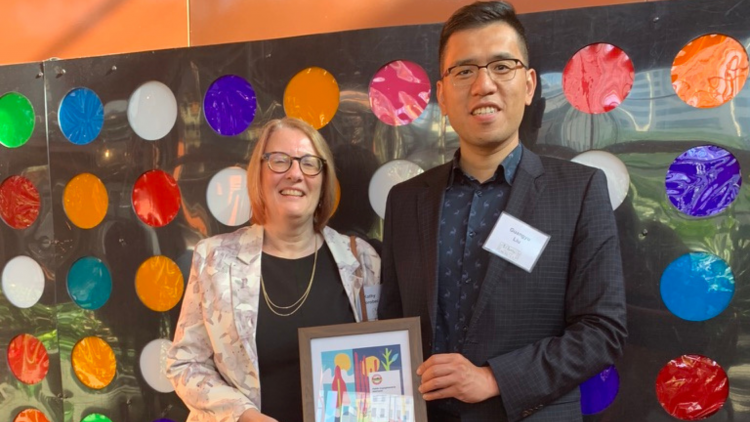Canada’s clean prosperity will be impacted by the need for green skills, as various sectors prepare for investments that could help reduce GHG emissions and other environmental challenges. It is important to expose young people to experts in the field to provide mentorship which could help inform and shape their own future green careers. We recently had a chat with Guangyu Liu, Chemist at Dow Canada, and Research and Science Specialist with GreenLearning to learn more about his work and how he was able to navigate the journey into his current profession.
The trajectory of Liu's green career has been much like that of most students who aren’t sure of what career path to pursue but eventually find themselves working in an extremely rewarding role within the green sector. When Liu immigrated to Canada with a bachelor's degree in medicine and a master’s in biomedical engineering, he didn’t exactly have clarity about the job or career path he was going to pursue. However, one thing was certain, he had a voracious appetite for learning and he approached every opportunity with a zeal for knowledge. Liu completed a PhD in Food Science and Technology from the University of Alberta. Shortly after graduation, he joined Dow Canada for an internship position, started learning on the job and has been working there for the past five years.
Although basic chemistry knowledge helps Lui to navigate the deliverables of his current role at Dow Canada, he believes that some essential skills students will need as they navigate their own professional pathways are critical thinking, information literacy and technological know-how. On a deeper level, Liu reads a lot of scientific material about the tasks that he is assigned and his passion for continuous learning has allowed him to gather a variety of hard and soft skills while on the job.
One project Liu has been working on at Dow involves analytical chemistry where he uses measurement science to measure and gather baseline data on microplastics which is then used to make improvements. He is also conducting research with Inter Pipeline and the Northern Alberta Institute of Technology (NAIT) on the measurement of plastics in the North Saskatchewan River. We asked Liu about his two years at GreenLearning to learn more about his participation in the Eco 360 program for youth. He responded that a huge part of his work as Dow’s Chemist also involves detecting contaminants in microplastics so that they could be removed through the process of up-cycling. It is with this wealth of knowledge and expertise that Liu contributed significantly to GreenLearning's backgrounder on Plastic Recycling, working in tandem with our Programs team.
“Students should know that plastic products can and should be recycled. This is to prevent these plastics from getting into the general waste, ending up in landfills, breaking down into microplastics and causing negative harm to the environment. Even more so, young learners should be aware of the fact that plastics are made from hydrocarbons that are derived from oil and gas. Therefore, when we use less plastic, we create less need to extract and use these resources from the earth. In addition, using less plastic can help to conserve the energy used in most plastic manufacturing processes,” says Liu. Having worked on a variety of scientific backgrounders for GreenLearning, he has become the go-to person for fact-checking to ensure the science is sound and accurate for many of our resources.
Liu underscored the importance of having a post-secondary education as the most basic requirement for working in the green sector. However, he is quick to reiterate that it is not the course of study that matters but understanding how it intersects with sustainability. “There isn’t one way to get into a career in the green economy. While science shows us how plastics are made and recycled, it is computer science and math that can create a model of how to detect contaminants in plastics while engineering could be used to optimize the manufacturing process and then educators play a role by sharing this education and awareness with young people.”
A day in the life? Liu often starts his day by checking and responding to emails, then going to the lab or doing field work to complete more of the research and testing on microplastics in water. Time management and prioritization are important day-to-day skills. In the future, Liu is interested in exploring data analytics and the business aspects of environment, sustainability and governance.
According to Liu, learning is not constrained by one’s environment. Students can keep reading to grasp a better understanding of the environment, while shaping their perspective of the world and in order to prepare for a future green career. Liu reads many business and technology books. One of them is Principle by Ray Dalio and The Innovator’s Dilemma by Clayton M. Christensen. He also has three mentors that he speaks to regularly on a monthly basis who he says have greatly helped his career to be successful.


